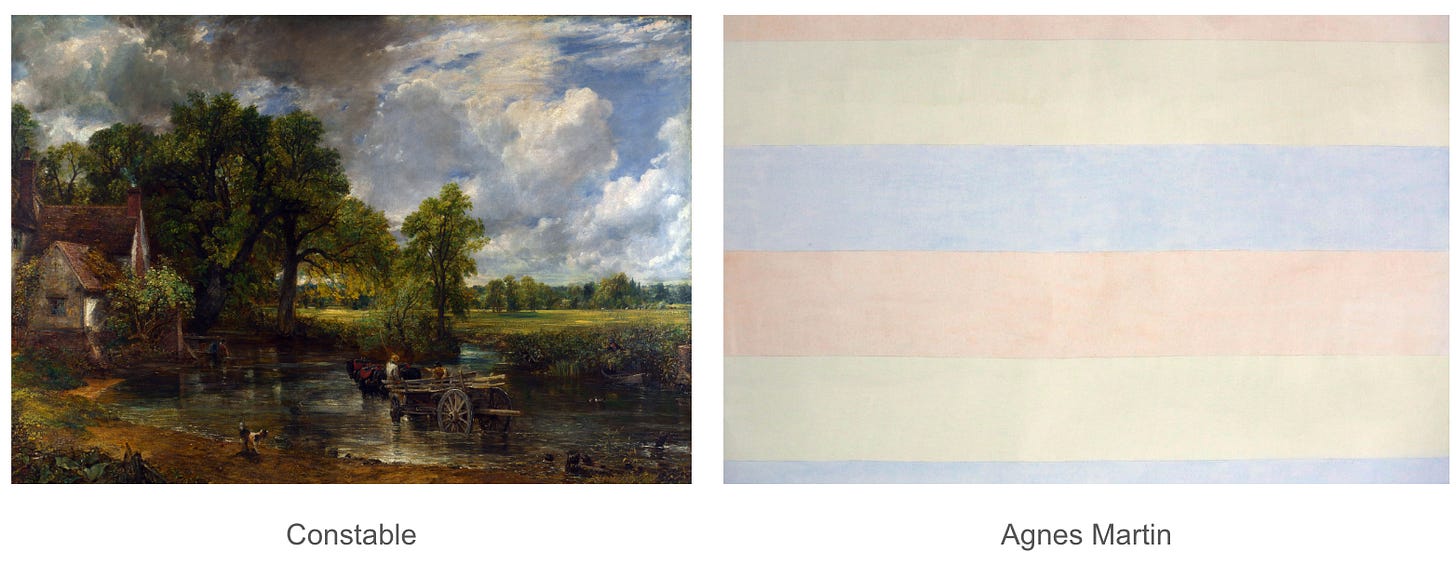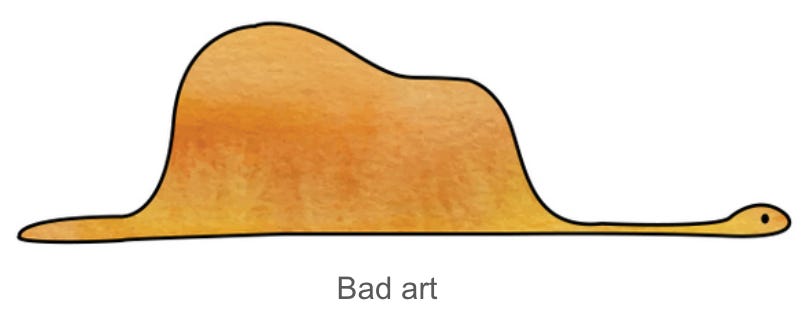TL’DR: most discussions on art and taste are pointless semantic games. So, rather than trying to come up with a universal answer to ‘what is good taste’, it’s better to start by defining taste, and then discussing what artworks are considered good by that definition.
Semantic games
Scott Alexander, Zvi, and SO have all written posts on taste, trying to pinpoint what taste means. They’re all worth reading, but I think none succeed in settling the question of what taste is.
Most of the big debates in the culture wars are impossible to settle because at their core we find fuzzy concepts that our language cannot properly capture. Who’s right on abortion? It depends on how we define ‘life’ and ‘consciousness’. Who’s right on trans issues? It depends on how we define ‘gender’ and ‘sex’. Both sides on these issues are playing semantic games, and because semantics are arbitrary, neither side can ever conclusively prove its case.
(That’s not to say that we cannot evaluate the strength of arguments made in these debates at all. Some arguments are more coherent and self-consistent, and some are self-contradictory. Obviously the former are stronger, because a person who advances a self-contradictory worldview will find themselves paralysed in some situations, or advocate opposite course of actions depending on how a question is framed. And some arguments have political, economic, and societal implications that can be judged on a utilitarian basis, at least in theory (e.g.: does allowing people born male to be imprisoned in women’s prisons do more harm or good? (assuming of course that people can agree on some way of measuring utility, which is itself subjective and vague)).)
‘Taste’ is like this. There can be no definite answer to what does it mean to have good taste, because everyone uses the word differently. The fact that three intelligent writers (not to mention countless philosophers and aesthetes) disagree with each other with no way to even begin resolving their different views is proof that the quest for a theory on taste is futile (mathematicians or physicists can also disagree at times — but they can also say what evidence they’d need to settle such disagreements).
A critique on the aforementioned essays
But we can point to inconsistencies or fallacies in arguments people have advanced in favour of their preferred definition of taste. For example, OS writes
“A work of (whatever) art can be either…treat[ed]…as assistance for our own activities” or enjoyed as a thing in itself. It’s only possible to get the special quantity and intensity of pleasure from treating a work of art as a thing-in-itself; you cannot get that type of pleasure from just using it.
But that’s just an assertion. I think there is deep aesthetic appreciation to be found in the use of functional objects. Eating with solid cutlery with good heft is more pleasurable than using a flimsy plastic fork; writing with a good fountain pen is more satisfying than using a Bic. What kind of pleasure is this, if not aesthetic?
OS also writes that
Good taste is usefully defined as the capacity for deep aesthetic pleasure, and the discernment to judge whether a given thing is capable of inducing deep aesthetic pleasure.
But this strikes me as an elitist thing to say: it suggests that some people with self-proclaimed good taste can judge the intensity of pleasure others experience from any given object. Basically, this says that the Mona Lisa is more capable of inducing deep aesthetic pleasure than Frozen. This is circular: someone has good taste if they appreciate things that others with good taste have determined are capable of inducing aesthetic pleasure. And yet — how many artists whom we now consider indisputable masters were derided in their own life time? What changed? Did their artworks become more capable of inducing aesthetic pleasure over time? Or were the tastemakers back then wrong? But if they were wrong… did they never have good taste to begin with? And if so, how can we ever know whether someone has good taste?
And Zvi writes that
I will stand up for taste Platonism and physics. I believe that, for all practical purposes, yes, there is a right answer to the Quality level of a given work, to whether liking it reflects good taste.
OK, so what is this right answer? Who specifies it? You can’t write a huge post on taste, then casually assert there are right answers, but not expand on that! That’s the heart of the matter.
On skill
So my own view is that debating ‘taste’ is hopeless (though not pointless — it’s fun and it helps us consider many different aspects of aesthetics). What’s more fruitful is to reduce the ambiguity inherent in loaded, ill-defined terms such as ‘taste’ and try and answer more well-defined questions.
For example, it doesn’t make sense to debate whether X is a good work of art. People trying to answer such a question will do so with reference to their own definition of ‘art’ or ‘good’, and if that definition differs from that of their interlocutor, they’ll find themselves talking angry dolphins (a wonderful expression borrowed from a friend: cross-purposes —> cross porpoises —> angry dolphins).
One thing I found interesting in reading the three posts I linked is that none of them discuss an artist’s skill or intention. In my view, considering the skill that it took to produce an artwork is one way to evaluate art: not an objectively better way, but at least one that lends itself to discussion.
As with sports, some artworks are harder to pull off, and therefore doing so can be sublime: they can inspire, motivate, and amaze the consumers of those artworks. Others are easier to pull off; they can still be appreciated on other grounds, and they are therefore not necessarily inferior. But it’s a distinction worth noticing.
Humorous use of language is harder than squeezing laughter out of fart jokes and so P.G. Wodehouse’s prose is more admirable and inspiring than Family Guy. Representational painting is harder than some modern artworks, for some of which the main skill the artist displays isn’t so much their work with a brush and canvas, but their dialectic, and their ability to break into the art world. So when evaluated with respect to technique, paintings by Old Masters are probably more notable than their modern counterparts.
(As I mentioned in my review of Get the Picture, the modern artist’s skill isn’t to be laughed at — not everyone can come up with paintings to express a concept, as Agnes Martin does:
My paintings have neither object nor space nor line nor anything—no forms. They are light, lightness, about merging, about formlessness, breaking down form.
But that skill is either invisible, or (rightly or wrongly) considered BS by most people, which is why a lot of people don’t like modern art. A similar thing happens in sports — the skill required for some sports is more obvious, and hence those sports are easier to consume. More people watch sprinting than curling, even though (as I learnt by overhearing a conversation on a ski lift) curling is surprisingly difficult and requires great skill to master.
Also note Tom Wolfe’s essay on Frederick Hart:
The winning entry was by a young Yale undergraduate architectural student […] Absolutely skillproof, it was.
[…] No artist of her generation (she was 21) could even conceive of a sculptor starting out solely with a picture in his head, a stylus, a brick of moist clay and some armature wire. No artist of her generation dared even speculate about . . . skill.
)
I also think the artist’s intention, and the extent to which they met their goal, matters. If you’re trying to paint a snake that has swallowed an elephant, but your drawing ends up looking like a hat, you’re bad at sketching, and it’s not the lack of imagination of your audience that’s to blame.
Using this lens, good taste is having the knowledge to determine how much skill was involved in producing a work of art, and appreciating it accordingly. So, someone who appreciates the humour in Evelyn Waugh or Kafka has more taste than someone who only laughs when watching The Other Guys.
(But, as per Zvi, don’t be a snob. You can laugh with subtle comedy and slapstick (and some slapstick is an art form on its own; it’s hard to do well!)
On difficulty
Yet another way to define and judge taste is one’s ability to evaluate ‘difficult’ works of art. Some things require more effort, patience, and focus to appreciate properly — for example, poetry is arguably harder to appreciate than other forms of literature, because it requires more conscious engagement (you can read a novel sort of on auto-pilot; granted, you won’t make the most of it if you do that, but you can still enjoy it. Harder to do that with a poem (though not with all poems.))
Personally, I like this definition of taste less than the previous one, because it’s more open to subjective judgement. In my example above, I defined difficulty by the effort it takes to consume a work of art; but one could argue that the difficulty in appreciating, say, modern art is understanding the context in which it was produced, and most philistines who deride modern art are ignoramuses who haven’t read the correct canon.
And what of taste beyond art?
We also talk of taste with regards to fashion, architecture, fashion, and even manners. I think the previous two definitions can be used to discuss these topics too: a well-tailored suit, or a dress, are harder to pull off than a tracksuit, and knowing how to appreciate them is a sign of good taste.
The point on intention is even more relevant to fashion. A lot of what that Twitter menswear guy talks about is how many men intend to dress ‘properly’ (i.e. in a suit), but don’t get the basics of suit-wearing right: they wear their trousers too low, or their coats too tight, or their ties in the wrong knot (though on this point I vehemently disagree with him: a good Windsor looks better than a four-in-hand. Anyway, short men like me cannot do the four-in-hand — the tie hangs too low.)
But when it comes to these areas, most mentions of taste have little to do with actual aesthetics, and more to do with intent to define in-groups, and denigrate those who don’t belong to them. When Y says that X has bad taste, what they usually mean is that X doesn’t belong to Y’s circle, and wasn’t brought up with the same cultural references and role models. Which is fine, we all tend to think that our manners and sense of style and so on are right; but using a loaded term such as ‘taste’ as short hand for ‘others don’t behave like we do’ is a bit disingenuous.





